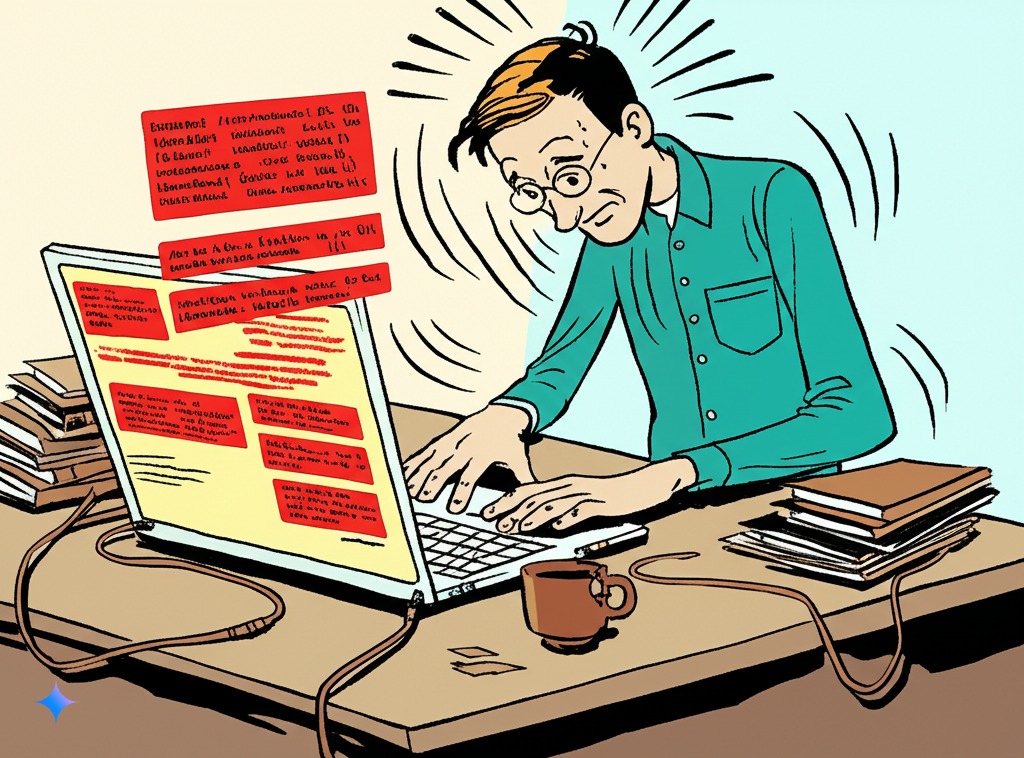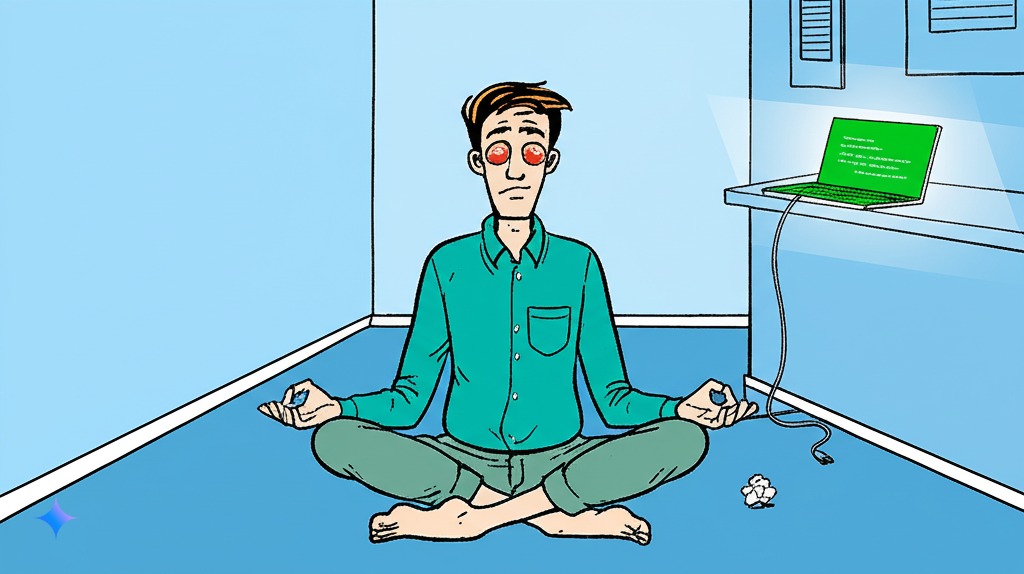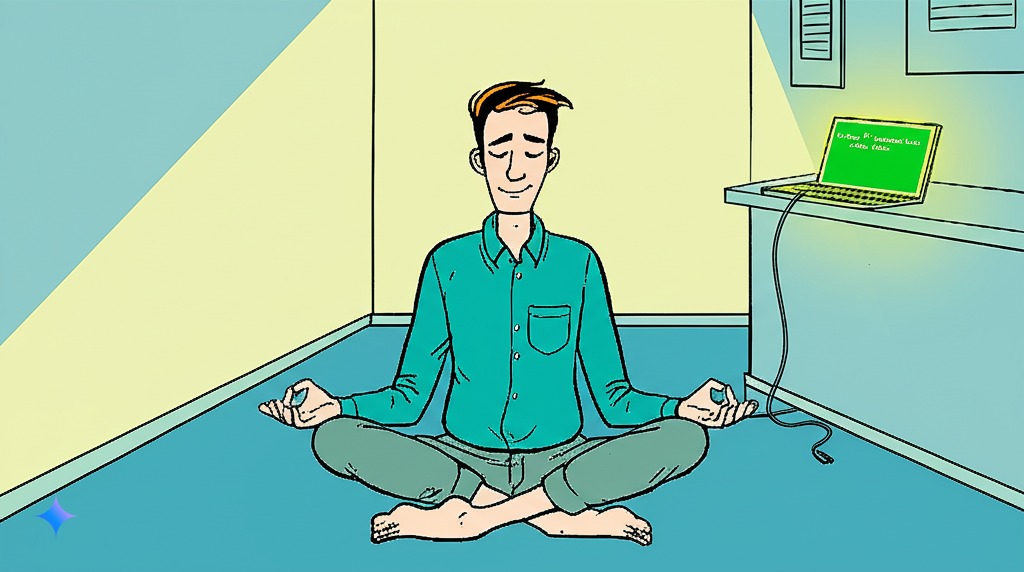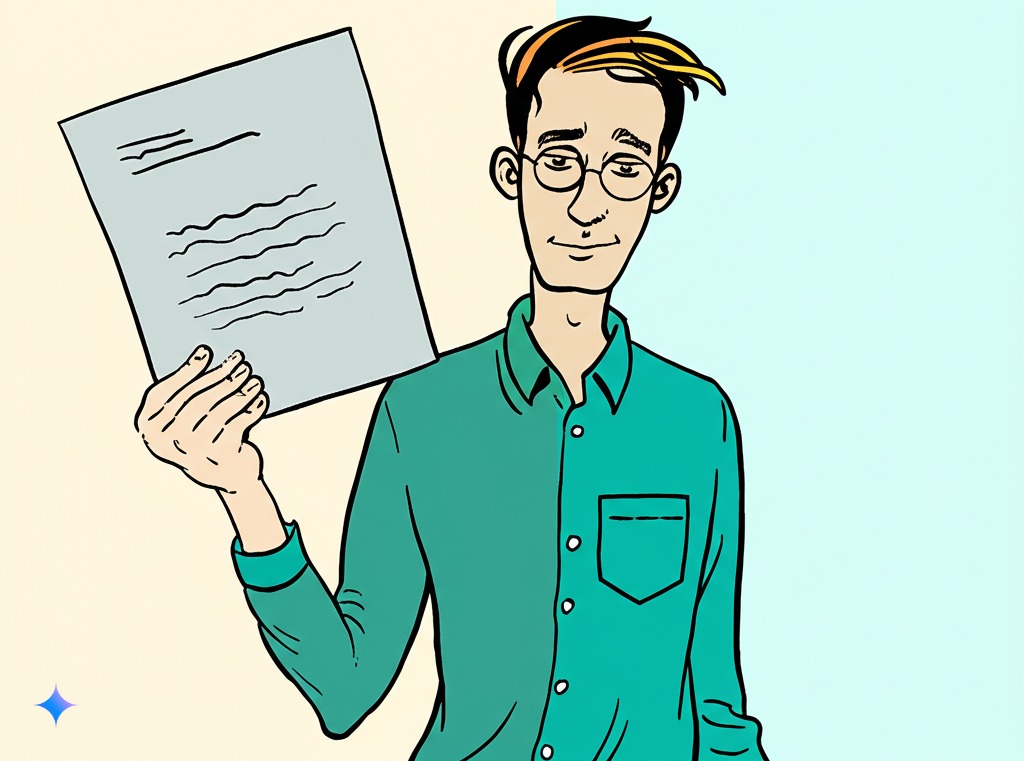From PhD Stress to MeditAItion: A Personal Journey
It's 3:47 AM. I'm staring at my PhD dissertation—a sea of LaTeX errors highlighted in angry red. My coffee has gone cold.

This was my life for months. Welcome to PhD hell, population: me and probably you too if you've ever pursued a doctorate.
When Academic Stress Meets Mindfulness (By Accident)
I didn't discover meditation through some enlightened journey of self-discovery. I stumbled upon it about two years ago, well into my PhD journey but long before I could see the finish line. My wife said: "You're going to have a heart attack if you don't chill out." She said it more diplomatically, like "You seem a bit stressed, honey, maybe try meditating?", but the message was clear: my stress levels were writing checks my body couldn't cash.

For two years, meditation became my secret weapon against academic meltdowns. It wasn't perfect, but it helped—sort of like academic duct tape for a fraying mind.
There's something deeply ironic about stress-shouting "RELAX ALREADY!" at yourself while trying to meditate during a PhD program.
The Great LaTeX Procrastination
But the idea for MeditAItion? That only hit me recently—at what should have been the finish line of my PhD journey. I now call it "The Great LaTeX Procrastination." I was supposed to be fixing citations in my dissertation's final chapters. Instead, I was doing what any rational PhD candidate would do: literally anything else.
"What if," my procrastinating brain wondered, "there was a meditation app that actually understood specific situations? Not just 'stress relief' but 'I'm trying not to throw my laptop out the window because LaTeX keeps misinterpreting my bibliography' type of situations?"
It was the culmination of two years of meditation practice colliding with the peak stress of finalizing my dissertation. The perfect storm of "I should be working on my PhD but instead I'm going to create something entirely new."
From Python Prototype to Flutter App
Rather than correct my dissertation or wait for LaTeX to compile (a process that seemed to operate on geological time scales), I opened up Python and started coding. Classic PhD student move—solving a problem nobody asked me to solve instead of the one that's actually due.
The first prototype was hideous: a Python script that generated meditation text based on simple prompts. It was clunky and the UI looked like something from 1995, but it worked! I could input "stressed about dissertation" and get a meditation specifically about academic anxiety. When it generated a meditation about "finding peace in the chaos of research deadlines," I nearly cried.
After a few days of tinkering (and yes, somehow still making progress on my dissertation), I realized this could be something real. So I did what any reasonable person would do: I created a entire Flutter App, a webpage, and this blog instead of finishing my PhD faster.

Somehow, the app started taking shape—a real mobile application with a UI that didn't make my eyes bleed.
When AI Research Meets Mental Health
The irony wasn't lost on me. My PhD research focused on AI and software testing, and here I was, not applying those same principles to help people not lose their minds. Like some weird academic ouroboros, my research was helping me cope with... my research.
What made MeditAItion different was that it inherited my own frustrations from two years of meditation attempts:
- It doesn't assume you're already calm (because who is?)
- It adapts to ridiculous specific situations (like "meditation for when your code won't compile")
- It doesn't judge you for being a beginner or having a mind that races at 100mph
- It avoids that weird ethereal voice that some meditation guides use that makes you feel like you're being inducted into a cult
The Technical Side (For My Fellow Nerds)
If you're like me and actually enjoy technical details (I see you, fellow developers), here's the nerdy stuff: MeditAItion's core is written in Dart using Flutter. A main generator component handles the AI prompt engineering, context management, and audio processing.
Moving from that initial Python prototype to Flutter was like upgrading from a bicycle to a motorcycle—still two wheels, completely different experience. Flutter's hot reload feature probably saved what little was left of my sanity during development. And, compared to LaTeX, Flutter's error messages are downright friendly and the compile times are almost non-existent. I mean I was able to build an entire app in the time it took LaTeX to compile my bibliography.
From Personal Therapy to Actual App
I never actually intended to release this. It was therapeutic code — the kind you write to distract yourself from your real problems. But after showing it to fellow PhD students and watching their stress-hardened faces soften while using it, I realized maybe this needed to exist in the world.
So now it's on the Google Play Store, and an iOS version is in the works. It still feels surreal. The app includes things like:
- Meditation durations for different attention spans (including the "I have the focus of a goldfish" 1-minute option)
- Settings for different experience levels (from "What is meditation?" to "I've been meditating since before you were born")
- AI-generated prompts for specific situations (like "meditation for when you're procrastinating on your dissertation")
The Dissertation Did Eventually Get Submitted
In case you're wondering, yes, I did eventually submit my dissertation. Ironically, building MeditAItion helped me cope with writing about AI. The app isn't perfect — much like my dissertation—but it's real, and it helps. And sometimes, that's enough.
So if you're struggling - With a PhD, with anxiety, or just with the general existential weight of being human—know that MeditAItion was built by someone who gets it. Someone who's been meditating for years but still once stress-ate an entire pack of Oreos while debugging a LaTeX table and then tried to meditate with cookie crumbs still on his shirt.
Because meditation isn't just for people who have it all together. It's especially for those of us who don't.

